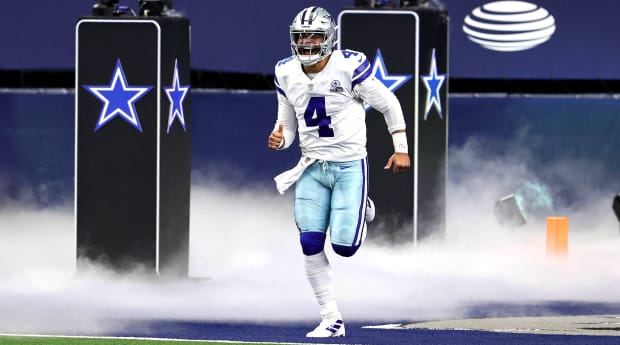It was a long time in the making, but Dak Prescott finally got what he wanted from the Cowboys with a long-term deal.
There is a lot of minutiae to be sorted out in the coming days; the kind of contractual bean counting that energizes a precious few of us and helps make sense of how the money is spread around to manipulate the salary cap, but the undisputed takeaway from Monday’s news that
Dak Prescott will remain in Dallas for the long-term is that he headlocked the Cowboys at the negotiating table—even if he had to limp there on a recovering ankle.The average per-year sum of $40 million is what he wanted when this entire process began two years ago; back when the Cowboys began the process of making him look greedy and out-of-touch. Back when, through their various media tributaries, they were able to paint Prescott as foolish for turning down a contract that was closer in value to that of Jared Goff and Carson Wentz (both of whom have been traded) and less like the deal that nestles him right behind Patrick Mahomes as the second-highest paid quarterback in football. As he exited the field on a shattered ankle last season, the prevailing thought seemed to be why he should have been grateful and taken the scraps.

Now, in a lot of ways, he gets a deal that might be preferable to Mahomes’s. Prescott can dip his hands back into the well a handful of times before Mahomes is able to wriggle his way out of a 10-year commitment in Kansas City (though there is a strong belief that it will be renegotiated before then). If he continues to play like one of the best quarterbacks in football, Prescott and the Jones family are destined to meet again before long, when Prescott is at the prime age of 31.
The lesson here, of course, is never to cave—especially when it comes to the Dallas Cowboys. They are one of the most fascinating teams in all of professional sports; a group that seems to revel in the public dust-up phase of contract negotiation and often succeeds in pinning players down to below-market, long-term deals thanks to the shine coming off their belt buckles.
But when the Cowboys see true value, they cave, recognizing ultimately that the possibility of an offensive fireworks display inside JerryWorld is preferable to being looked at as a suave negotiator. Remember when Jerry Jones quipped that he didn’t know his running back, Ezekiel Elliott, before signing him to a top-of-the-market deal (and selling T-shirts to commemorate his empty threat)?
That kind of thing has been happening for decades, all the way back to the Troy Aikman era, when he told Aikman’s agent that they’d “passed fair $4 million dollars ago” en route to a $50 million contract and, quite simply, that “this dog won’t hunt.” It wasn’t long before the pair was on stage taking pictures together and selling commemorative helmets. Before Jones was in Dallas, the Cowboys had a local public access cable show that they’d air, notifying viewers of where a greedy draft pick’s parents were working, prodding them to write the dad letters about why his son should settle for less.
What makes Prescott different was the nature and the strength of his leverage. At a time when some saw his injury as a notification to the rest of the league that he was on his way out, those in Dallas almost certainly took a long look at the rest of football and realized how hopeless they were without him.
Give those in Dallas’s front office credit for one thing: They didn’t make the ultimate mistake of drawing Prescott even further down a painful road. The franchise tag route, which would ultimately put Dallas in a similar situation as Washington and Kirk Cousins a few years ago, is the kind of narrow, hollow-headed thinking that dooms a franchise and prevents it from building with a franchise quarterback for the long term.
That never seemed like the way it was headed. Socially distant guidelines be damned, we’re not far away from seeing Jones wrap Prescott up in a bear hug before telling the media this was always how it was going to go down. Just not without a full-court press to get Prescott to settle for far, far less than he deserved.


0 Comments